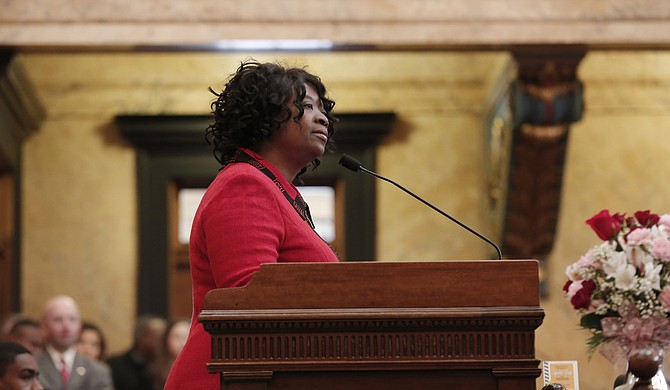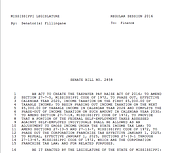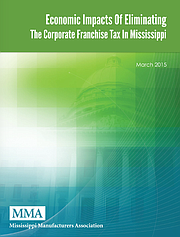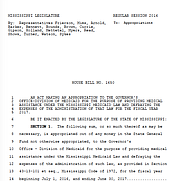Rep. Omeria Scott, D-Laurel, questioned House Public Health Committee Chairman Sam Mims, R-McComb, about a program in the Division of Medicaid’s appropriations bill, which sparked a controversial amendment last week. Photo by Imani Khayyam.
Taxpayers could get a pay raise if the Taxpayer Pay Raise Act of 2016 becomes law, but after two hours of debate last week, several senators asked, "At what cost?"
The bill, authored by Sen. Joey Fillingane, R-Sumrall, would phase in tax cuts for the 3 and 4 percent income-tax brackets (the two lowest), the corporate franchise tax, and small business and self-employment taxes. Over a period of 15 years, with no growth accounted for, the state's general fund would lose $575 million from the cut. In its first year, the bill would divert $18 million away from the state's general fund.
By eliminating income tax for some Mississippians, Fillingane said they would, in turn, be able to take that money and use it in the state's economy to bolster the state's dwindling sales tax. In the past year, sales-tax transfers to the state's general fund have fallen into negative percentages. Fillingane said the bill also would help to bring better-paying jobs to the state.
"This is an option we have, and this will give our taxpayers a pay raise—especially the franchise-tax piece of this makes Mississippi more competitive, not less competitive," Fillingane said.
Senate Democrats disagreed, questioning the chairman of the Senate Finance Committee and speaking on the bill separately. Using Mississippi Department of Revenue data, Sen. David Blount, D-Jackson, spoke against the bill, expressing frustration that senators received no numerical data about the effects of the tax cuts. Sen. David Blount, D-Jackson, handed out Department of Revenue number estimates to senators that showed the cost of each phase-out tax cut.
When the state economy's growth is estimated at 3 percent annually, the bill would divert $896 million away from the state's general fund, Blount said. He and other Senate Democrats decried the proposed tax cuts, especially when public education and the Mississippi Department of Human Services are in need of full or additional funding.
"If you vote for this, what you need to say to community colleges and social workers and everybody else who needs a pay raise is that I chose not to vote to help you," Blount told the Senate.
Fillingane disagreed, saying that the state can and has increased funding for education and other state agencies while cutting taxes. "We can prioritize spending; we've increased education funding while at the same time cutting taxes and not growing the size of government," he said.
The suggested income tax cuts would affect about 44 percent of the population, or 600,000 taxpayers, Sen. Gray Tollison, R-Oxford, said while questioning Blount, and pointed out that the bill would affect a large portion of the state's population.
Blount agreed but said that the bill actually benefits those who make more money. He said that a family making $30,000 annually would receive $163 a year from the tax cut, but those with higher incomes would receive more money back.
"I don't think this is being done fairly," Blount said. "The more you make; the more you benefit."
Sen. Hob Bryan, D-Amory, also spoke against the bill's effects on state agencies and the one study, conducted by the National Strategic Planning & Analysis Research Center and the Mississippi State's College of Business on behalf of the Mississippi Manufacturers Association, that the bill is based on. "This piece of legislation reduces the size of the general fund by 10 percent," he said.
"If you're voting for this piece of legislation, you're voting to take 10 percent out of every (state) agency."
Lt. Gov. Tate Reeves supports the bill. In a press release from his office, the Republican said that eliminating the franchise tax alone would grow the state's GDP by $282 million and added 3,514 jobs within 10 years, according to the Mississippi State University study.
The Mississippi Manufacturers Association, which supported the study, incidentally has the most to gain from cutting the corporate franchise tax in Mississippi. In fiscal-year 2014, the manufacturing industry paid the state $56 million in corporate franchise taxes—more than any other industry. This statistic is in the study that all senators received in support of the bill last week. The study says that eliminating the corporate franchise tax would result in revenue of $28 million for state and local tax revenue by 2025.
Mississippi is one of 14 states that has a franchise tax—West Virginia and Missouri have phased theirs out in the past two years—but neighbor states, Louisiana and Alabama, both have franchise taxes.
Bryan decried the idea that one study could be the basis for the multi-tax cut plan. He presented an unsuccessful amendment that would have held the NSPARC and Mississippi State College of Business and Industry responsible for the bill by allowing deductions from their budget if the revenue effect is lower than their study determined.
"This plan moves Mississippi toward a flatter, fairer tax policy..." Lt. Gov. Reeves said in a statement.
"As a conservative Republican, I believe Mississippi can reduce the size of government and direct funds to priorities like public schools and infrastructure while putting more money back into taxpayers' pockets."
The bill passed by a vote of 39-11 but was held on a motion to reconsider by Blount and had not passed to the House at press time.
House Starts Budget Work
While the Senate cut taxes last week, the House started working on state agency appropriation bills, and most agencies are looking at similar levels of funding as last year—with the exception of the Mississippi Department of Human Services, which needs its increase to comply with the Olivia Y lawsuit and avoid federal receivership.
State agencies already took a 1.5 percent budget cut in January, and the state economist projects that Mississippi's expected GDP growth is supposed to be stagnant for the next two years at 2.2 percent.
House Appropriations Chairman Rep. Herb Frierson, R-Poplarville, told the House last week that the state's rainy day fund is no longer full and most of the appropriations bills followed the Legislative Budget Recommendation from the Legislative Budget Office, which works with appropriations committees in both chambers to establish budgets the state can afford.
Frierson let the chairmen of appropriations sub-committees present the bills, and the Division of Medicaid's appropriation bill set off tension last week. The House had already approved several appropriations bills, but on Medicaid's budget, Rep. Omeria Scott, D-Laurel, asked Public Health and Human Services Committee Chairman Sam Mims, R-McComb, what the Mississippi Delta Medicaid Population Health Demonstration Project, which is spelled out to receive funding in the bill, was. Mims did not know and promised Scott to make a phone call and find out after he left the lectern. Rep. Scott was not appeased.
"There is a problem there, when we bring these appropriations bills up here, someone ought to be able to tell us what this is for," Scott told Mims.
Frierson and Mims then offered an amendment to strike the program completely from the bill—without knowing what it does or how much funding it required. The amendment passed by a voice vote, and Rep. David Baria, D-Bay St. Louis, attempted to table the amendment and lost.
The project is a pilot program to investigate new models of healthcare delivery that have the potential to improve overall health outcomes of the Medicaid population in a five-county area in the Mississippi Delta, according to an emailed statement from David Dzielak, the division's executive director. The funding request for the project in fiscal-year 2017 is $1.9 million.
Rep. John Hines, D-Greenville, spoke against the amendment and held the bill on a motion to reconsider.
On Thursday the House tabled the amendment, so the Delta program will continue to receive funding. Several appropriations bills had not passed by press time; the deadline is the end of this week.
For more legislative news visit jfp.ms/msleg.
More like this story
- Mississippi Lawmakers Pass a Slim Budget, Substantial Tax Cut, Slash Social Services
- State Tax Cuts Would Divert $575 Million from State Fund
- The Final Stretch: Budget Cuts, Tax Breaks and Bills Becoming Law
- 2016 Legislative Preview: Year of the Looming Tax Break(s)?
- Budget, Tax and Infrastructure Woes






Comments
Use the comment form below to begin a discussion about this content.